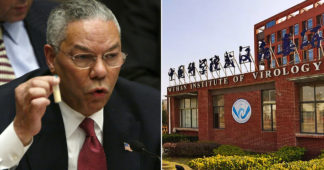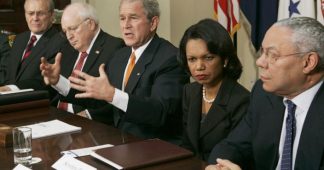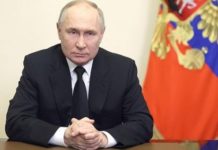By Andre Damon
On May 23, the Wall Street Journal published an article titled “Intelligence on Sick Staff at Wuhan Lab Fuels Debate on Covid-19 Origin.” Citing unnamed “current and former officials,” it claimed that researchers at the Wuhan Institute of Virology “went to hospital in November 2019, shortly before confirmed outbreak” of COVID-19.
Two days later, on May 25, Health and Human Services Secretary Xavier Becerra, speaking at the United Nations World Health Assembly, demanded a “transparent” investigation into the origins of COVID-19.
The next day, on May 26, US President Joe Biden called on the “Intelligence Community” to investigate whether COVID-19 arose “from a laboratory accident” and “report back to me in 90 days.”
Media reports by NBC, CNN, and the New York Times followed. All of them claimed that the Biden Administration’s actions were triggered by the “new evidence” presented in the Wall Street Journal article. Within 24 hours of publication of the Journal’s report, all of these publications declared that the Wuhan Lab conspiracy theory was “credible.”
But the article published by the Wall Street Journal—beyond being totally unsubstantiated and presenting nothing fundamentally new in terms of “intelligence”—is presented by a lead author who happens to have helped fabricate the most lethal lie of the 21st century.
The lead author of the Journal piece, Michael R. Gordon, was the same man who, along with Judith Miller, wrote the September 8, 2002 article falsely asserting that Iraqi President Saddam Hussein was seeking to build a nuclear weapon.
That article, entitled “U.S. says Hussein intensifies quest for a-bomb parts,” claimed that “In the last 14 months, Iraq has sought to buy thousands of specially designed aluminum tubes, which American officials believe were intended as components of centrifuges to enrich uranium.”
The claim was a lie, funneled to the Times by the office of US Vice President Dick Cheney.
On May 26, 2004, the Times published a letter from its editors entitled “FROM THE EDITORS; The Times and Iraq,” acknowledging that the Times repeatedly “fell for misinformation.” The letter notes,
But we have found a number of instances of coverage that was not as rigorous as it should have been…
On Sept. 8, 2002, the lead article of the paper was headlined “’U.S. Says Hussein Intensified Quest for A-Bomb Parts.’” That report concerned the aluminum tubes that the administration advertised insistently as components for the manufacture of nuclear weapons fuel. … it should have been presented more cautiously… Administration officials were allowed to hold forth at length on why this evidence of Iraq’s nuclear intentions demanded that Saddam Hussein be dislodged from power: “’The first sign of a ‘smoking gun,’ they argued, may be a mushroom cloud.”
In a 2005 article by its public editor, the New York Times acknowledged in relation to the coverage by Miller, including the article co-authored by Gordon:
Miller may still be best known for her role in a series of Times articles in 2002 and 2003 that strongly suggested Saddam Hussein already had or was acquiring an arsenal of weapons of mass destruction. Howell Raines was then the executive editor of The Times, and several articles about weapons of mass destruction were displayed prominently in the paper. Many of those articles turned out to be inaccurate.
Polk award-winning journalist Robert Parry subsequently commented on Gordon’s role in the story:
The infamous aluminum tube story of Sept. 8, 2002, which Gordon co-wrote with Judith Miller, relied on U.S. intelligence sources and Iraqi defectors to frighten Americans with images of “mushroom clouds” if they didn’t support President George W. Bush’s invasion of Iraq. The timing played perfectly into the administration’s advertising “rollout” for the Iraq War.
Of course, the story turned out to be false and to have unfairly downplayed skeptics of the nuclear-centrifuge scenario. The aluminum tubes actually were meant for artillery, not for centrifuges. But the article provided a great impetus toward the Iraq War, which ended up killing nearly 4,500 U.S. soldiers and hundreds of thousands of Iraqis.
Gordon’s co-author, Judith Miller, became the only U.S. journalist known to have lost a job over the reckless and shoddy reporting that contributed to the Iraq disaster. For his part, Gordon continued serving as a respected Pentagon correspondent.
Over the subsequent decade and a half Gordon continued to serve as a conduit for fabricated “intelligence” emanating from the White House, the Pentagon and the CIA.
On April 20, 2014, Gordon co-authored an article entitled “Photos Link Masked Men in East Ukraine to Russia,” which claimed to identify masked men operating in eastern Ukraine in opposition to the US-backed coup regime as active-duty Russian soldiers.
Gordon wrote,
Now, photographs and descriptions from eastern Ukraine endorsed by the Obama administration on Sunday suggest that many of the green men are indeed Russian military and intelligence forces — equipped in the same fashion as Russian special operations troops involved in annexing the Crimea region in February.
Four days later, the Times Public editor was again compelled to retract the claims in Gordon’s reporting, calling them “discredited.”
The Times led its print edition Monday with an article based in part on photographs that the State Department said were evidence of Russian military presence in popular uprisings in Ukraine. The headline read: “Photos Link Masked Men in East Ukraine to Russia.”
More recently, some of those grainy photographs have been discredited. The Times has published a second article backing off from the original and airing questions about what the photographs are said to depict, but hardly addressing how the newspaper may have been misled.
It all feels rather familiar – the rushed publication of something exciting, often based on an executive branch leak. And then, afterward, with a kind of “morning after” feeling, here comes a more sober, less prominently displayed follow-up story, to deal with objections while not clarifying much of anything …
And the reporter Robert Parry (formerly of Newsweek and The Associated Press) on Consortiumnews.com sees a pattern in Times articles, often based on administration leaks, that “draw hard conclusions from very murky evidence while ignoring or brushing aside alternative explanations.”
Summing up the role played by the media in the run-up to the Iraq war, WSWS editorial board chairman David North wrote in War, oligarchy and the political lie:
It must be stressed that the mass media was not duped by the Bush administration, but functioned as its willing accomplice in the deliberate deception of the American people. There was nothing that was particularly sophisticated in the government’s propaganda campaign. Much of what it said was contradicted by both established facts and elementary logic. Even when it was established that the administration’s claim that Iraq had sought to obtain nuclear material was based on crudely forged documents, the media chose not to make a major issue of this devastating exposure.
Now the war is over at the cost of countless thousands of Iraqi lives. The country lies in ruins. Much of its industrial, social, and cultural infrastructure has been destroyed. During the past three weeks, US military forces have combed Iraq in search of the weapons of mass destruction that could be seized upon by the administration and media to justify the war. And what has been found? Nothing.
The same kind of “deliberate deception” by the media in relation to “weapons of mass destruction” used to prepare the Iraq war is being reprised in the ongoing campaign by the Biden administration and the media to promote the claim that COVID-19 emerged from the Wuhan Institute of Virology. Just as the lies of 2002 led to the destruction of Iraq and the deaths of over a million people, the current US propaganda campaign against China risks provoking a military conflict on a far more devastating scale.
Published at www.wsws.org
We remind our readers that publication of articles on our site does not mean that we agree with what is written. Our policy is to publish anything which we consider of interest, so as to assist our readers in forming their opinions. Sometimes we even publish articles with which we totally disagree, since we believe it is important for our readers to be informed on as wide a spectrum of views as possible.











